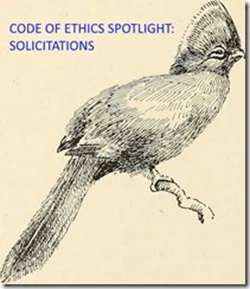 There's no section in the NASW Code of Ethics that you can just shrug off as you're practicing social work and/or preparing for the social work licensing exam. Everything's there for a reason. Just imagine the long hours of committee meetings that must've been logged to come to an agreement on the entire code and all the wording in it. Rule of thumb: if it's in the code, it's fair game for the exam.
There's no section in the NASW Code of Ethics that you can just shrug off as you're practicing social work and/or preparing for the social work licensing exam. Everything's there for a reason. Just imagine the long hours of committee meetings that must've been logged to come to an agreement on the entire code and all the wording in it. Rule of thumb: if it's in the code, it's fair game for the exam.
So, continuing our random jump in and around the code, here's section 4.07, Solicitations, part of "Social Workers' Ethical Responsibilities as Professionals." Here's how it goes:
(a) Social workers should not engage in uninvited solicitation of potential clients who, because of their circumstances, are vulnerable to undue influence, manipulation or coercion.
(b) Social workers should not engage in solicitation of testimonial endorsements (including solicitation of consent to use a client's prior statement as a testimonial endorsement) from current clients or other persons who, because of their particular circumstances are vulnerable to undue influence.
Simple enough. So what might a question on the licensing exam invoking this section look like? How about this?:
At a final session before the holidays, a client thanks a social worker for helping her manage problems with work, family, and in her relationship. She says she wants to post a positive review of the therapist on Yelp and elsewhere. What is the MOST ethical way for the social worker to respond?
Pause here to consider what the likely answers would be and what the correct answer might look like. Since you just read the section of the code addressing this, you're probably all set to answer.
Responses might look something like this:
A. Since therapy is being terminated, accept the client's offer to post a review.
B. Since the therapist has not requested the review, accept the client's offer.
C. Thank the client without accepting or rejecting the client's offered review.
D. Discuss reciprocity within the therapist-client relationship with the client.
Maybe this is a little trickier than it originally looked. Let's go one by one:
A involves misreading the vignette--therapy is not being terminated. It's just the last session before a holiday break. If therapy were being terminated, that would make the question even trickier. Phew!
B is extremely tempting, and follows the letter of the code from this section. However, it doesn't fully take into account other parts of the code (regarding, for example, dual relationships). If there were no better answer, this would be the go-to.
C involves being vague about the therapist-client relationship--perhaps this is ethical, but it's not particularly good clinical social work. Move on.
D sounds most like what a good therapist would first do in this situation--talk about it. Explore the client's impulse to pay the clinician in a way not already contracted with the client (fee for service, most likely). Does the client feel obligated to please the therapist? How does this follow the client's relationship patterns outside of therapy?
Answer: D. This was a hard one! How'd you do?
***
For questions about the NASW Code of Ethics and all of the other areas covered on the social work licensing exam, sign up for SWTP practice!
September 19, 2014
Categories :

 There's no section in the NASW Code of Ethics that you can just shrug off as you're practicing social work and/or preparing for the social work licensing exam. Everything's there for a reason. Just imagine the long hours of committee meetings that must've been logged to come to an agreement on the entire code and all the wording in it. Rule of thumb: if it's in the code, it's fair game for the exam.
There's no section in the NASW Code of Ethics that you can just shrug off as you're practicing social work and/or preparing for the social work licensing exam. Everything's there for a reason. Just imagine the long hours of committee meetings that must've been logged to come to an agreement on the entire code and all the wording in it. Rule of thumb: if it's in the code, it's fair game for the exam.